In the ever-evolving landscape of digital marketing, Search Engine Optimization (SEO) remains a pivotal aspect in ensuring visibility and traffic for websites.
With the emergence of AI-driven tools, content creation and optimization have seen a significant transformation. Among these tools, ChatGPT, developed by OpenAI, has gained significant recognition for its ability to generate natural-sounding text.
In this comprehensive article, we delve into the evolution of ChatGPT prompts, examples of 10 effective prompts, and the inherent benefits they offer.
The Evolution of ChatGPT Prompts
ChatGPT, a product of OpenAI, builds upon a lineage of language models that have steadily advanced the field of natural language processing (NLP).
Its predecessors, including GPT-2 and GPT-3, laid the groundwork for ChatGPT's architecture, which employs deep learning techniques and extensive data sets to understand and generate human-like text.
Through successive iterations, ChatGPT has exhibited improved capabilities in understanding context, generating coherent responses, and adapting to diverse prompts, marking a significant leap in the realm of AI-generated content.
Continuous learning from a vast amount of data has fueled its evolution, improving its capacity to mimic human language and meet various needs across industries.
What are ChatGPT prompts?
ChatGPT prompts serve as input instructions provided to the AI model to generate specific responses or content. These prompts act as cues or starting points, guiding the AI to produce coherent, relevant, and contextually appropriate text based on the given input.
The prompts can range from simple queries to detailed instructions, enabling users to harness the AI's potential for various purposes, including content creation, answering queries, completing tasks, and more.
ChatGPT's prompt-based system allows users to shape the generated content by tweaking the input parameters and adjusting the length, tone, style, and specificity of the output. This flexibility empowers content creators and marketers to tailor the AI-generated text to suit their SEO strategies and target audience preferences.
Best ChatGPT Prompts For SEO
There is no doubt in the fact that every business needs SEO to boost its online visibility. Here's a detailed breakdown of the best Chat GPT prompts specifically designed to enhance a business's SEO efforts
WAIT !!
Long-Tail Keyword Expansion
Prompt: “Generate a list of long-tail keywords related to the primary term 'travel destinations' that could enhance content visibility and target specific user searches."
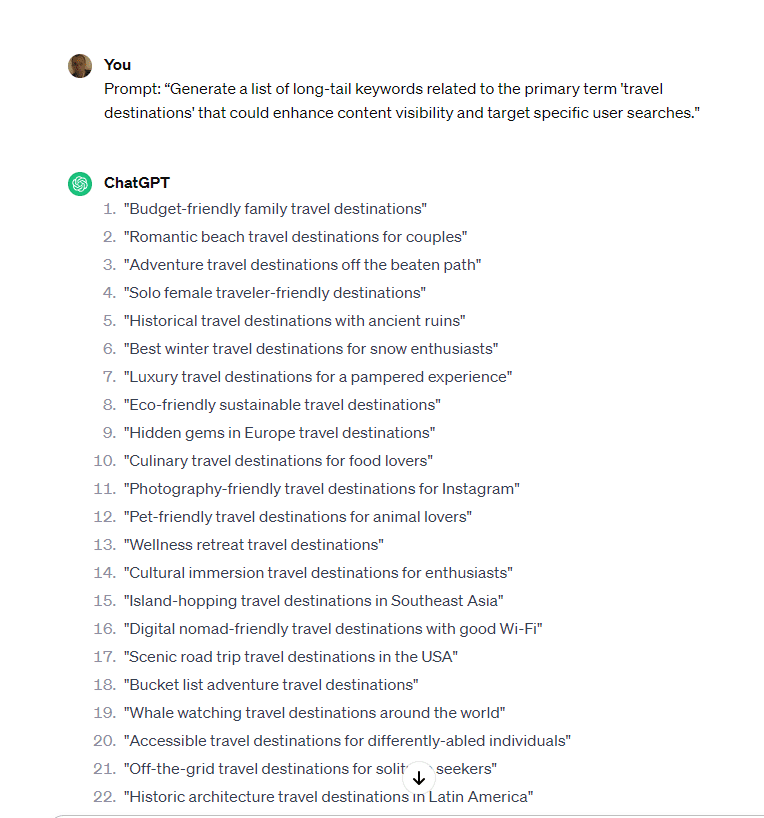
Prompt: "Given the seed long keyword "[Your Keyword]," analyze user intent for various combinations of it with location modifiers, problem statements, and solution questions. For each combination, suggest 5 highly relevant long-tail keywords and explain the specific user intent behind each".
Prompt: "Analyze current and upcoming trends related to "[Your Keyword]" and generate 10 long-tail keywords based on anticipated search volume spikes".
Prompt: "Create a comprehensive outline for a long-form blog post or guide targeting the keyword "[Your Keyword]," using long-tail keywords as subheadings throughout to improve internal linking and topic depth".
Prompt: "Use a popular image related to "[Your Keyword]" as a prompt to generate 15 unexpected and creative long-tail keywords focusing on specific details or interpretations within the image."
Keyword Research Prompt
Effective keyword research involves going beyond surface-level searches. Use these prompts to dig deeper, uncover hidden opportunities, and craft a targeted keyword strategy that attracts the right audience and drives results.
Seed Keyword Alchemy: "Given my seed keyword 'vegan baking,' generate 10 related keywords using synonyms, question phrases, and long-tail variations."

Trend Tracker: "Analyze popular social media hashtags and communities relevant to my niche, extracting untapped long-tail keywords with high engagement potential."
Competitor Spy Game: "Scrape the top-ranking blog posts and landing pages of my main competitors and extract their high-performing keywords for inspiration."
Customer Curiosity: "Conduct surveys or interviews with target audience members to uncover their pain points and hidden search queries to inform your keyword strategy."
Seasonal Shifts: "Predict upcoming seasonal trends and events related to your niche and generate seasonal keyword variations to capitalize on search spikes."
Intent Decoder: "For the keyword 'best running shoes,' identify different buyer intents (beginner, performance, injury prevention) and generate targeted keyword sets for each."
Question Authority: "Use ChatGPT to generate a list of common questions and concerns your target audience might have about your product or service, turning them into relevant keywords."
Local Lure: "If targeting a specific region, incorporate local landmarks, events, and slang into your keyword research to reach nearby audiences."
Visual Inspiration: "Analyze popular Pinterest boards and image searches related to your niche to unlock visually-driven keywords and content ideas."
Future Focus: "Research upcoming industry reports, conferences, and product launches to predict future trends and identify proactive keywords your competitors might be missing."
Voice Search Whisperer: "Focus on natural language phrases and conversational queries people might use with voice assistants (Alexa, Google Home) when searching for your topic."
Related Content Rabbit Hole: "Use ChatGPT to analyze popular content (articles, videos) within your niche and extract hidden keywords and subtopics you might not have considered."
"Hidden Gems" Discovery: "Explore niche forums, community groups, and Q&A platforms to uncover rarely used keywords and specific language that resonate with your target audience."
FAQ Content Creation
Prompt: "Generate a series of FAQ-style answers related to 'local SEO techniques,' covering essential strategies, tools, and tips for businesses aiming to improve local search rankings."
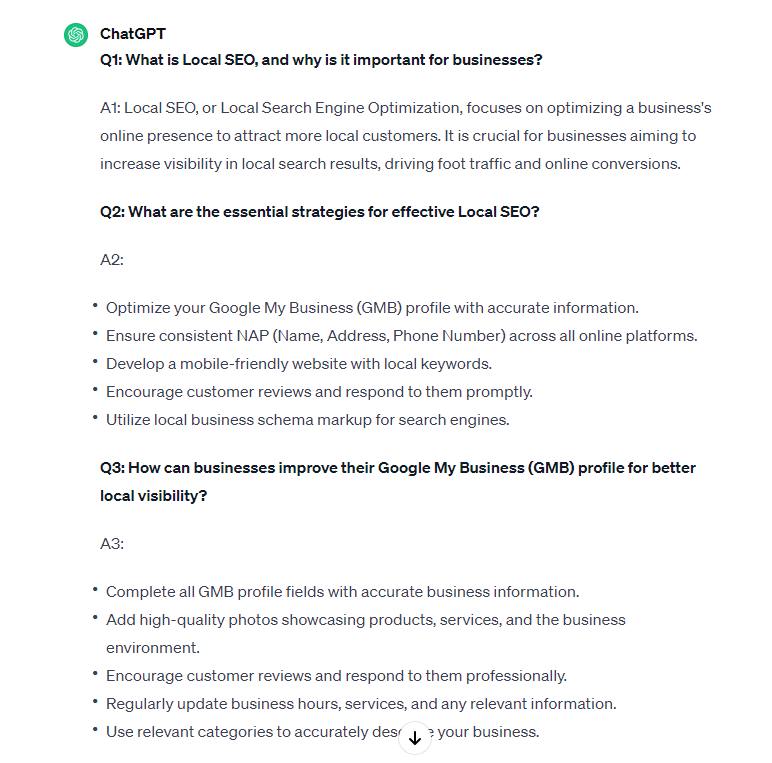
Prompt: Go beyond the typical search queries and generate 10 unexpected questions your target audience might have about "[Your Keyword]," even if they haven't explicitly voiced them online. Answer these questions in your FAQ to address hidden concerns and provide comprehensive information.
Prompt: Create separate sets of FAQs for different buyer personas within your target audience. Tailor the questions and answers to their specific needs, challenges, and levels of knowledge about "[Your Keyword]."
Prompt: Analyze long-tail keywords related to "[Your Keyword]" and identify potential subtopics or specific nuances users might be searching for. Craft FAQs that address these specific queries and add depth to your overall knowledge base.
Prompt: Develop interactive FAQs that go beyond text. Include quizzes, polls, and interactive elements to engage users and personalize their experience. This can also collect valuable data for future content optimization.
Explanation: FAQs cater directly to user queries, enhancing engagement and SEO performance. This prompt focuses on creating a series of FAQs dedicated to local SEO techniques.
The content should address common queries businesses might have about local SEO, such as optimizing Google My Business listings, leveraging local keywords, obtaining local citations, and encouraging customer reviews.
The goal is to establish authority, provide valuable information, and boost local search rankings.
Content Topic Ideation
Prompt: "Generate content ideas on 'content optimization trends for the upcoming year,' focusing on emerging practices and their relevance in driving organic traffic."
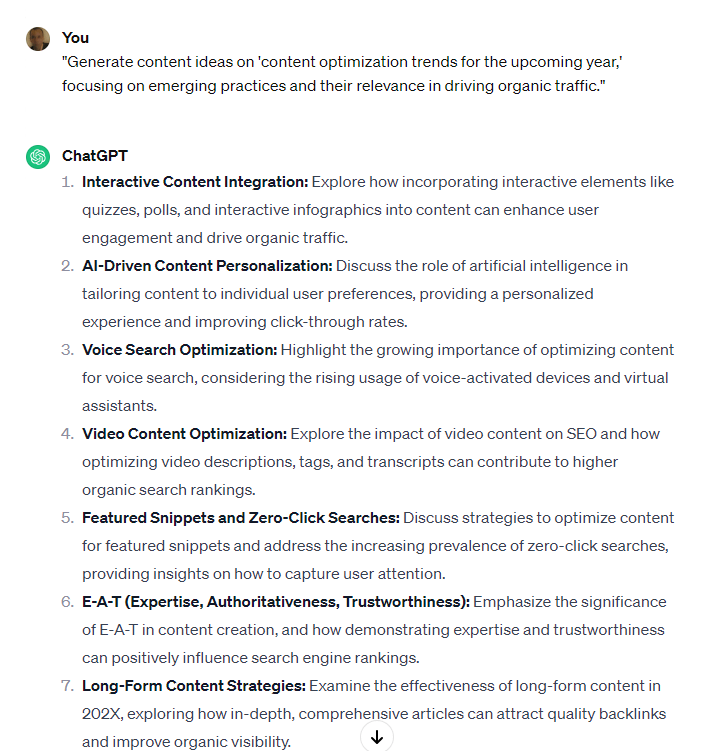
Prompt: Analyze current and upcoming trends related to "[Your Keyword]" using tools like Google Trends, Buzzsumo, or social media listening platforms. Generate 10 content ideas that capitalize on these trends for early SEO and traffic advantage.
Prompt: Identify upcoming holidays, events, or seasonal changes relevant to "[Your Keyword]". Craft 5 engaging content ideas that leverage the seasonal context and offer timely solutions or insights for your audience.
Prompt: Analyze the top 10 competitor content pieces for "[Your Keyword]". Identify gaps in their coverage, outdated information, or missed angles. Generate 3 content ideas that address these gaps and establish your unique expertise.
Prompt: For each of the top 10 long-tail keywords related to "[Your Keyword]". Brainstorm 5 different user motivations prompting the search. Then, develop content ideas with titles and meta descriptions that directly address these motivations and capture user attention.
Explanation: Staying ahead of evolving trends is crucial in SEO. This prompt aims to brainstorm blog post ideas centered on forthcoming content optimization trends. The content should explore emerging practices, tools, and strategies expected to impact SEO in the coming year.
It should discuss the relevance of these trends in driving organic traffic, improving user engagement, and adapting to changing search algorithms, providing insights to aid marketers and content creators in preparing for the future.
Content For Landing Pages
Prompt: "Create persuasive content for a 'digital marketing agency's landing page,' highlighting services, expertise, and success stories to improve conversions and SEO performance."

Prompt: List the top 10 benefits of "[Your Product/Service]" in descending order of importance to your target audience. Then, create concise and impactful bullet points that showcase those benefits in a clear and persuasive way on the landing page.
Prompt: Craft 3 different testimonials or customer reviews that effectively highlight the value of "[Your Product/Service]," incorporating strong calls to action within the quotes themselves.
Prompt: Identify the 3 most significant negative consequences or pain points that your target audience experiences without "[Your Product/Service]." Write a landing page section that powerfully addresses these fears and positions your offering as the solution.
Explanation: Landing pages serve as critical touchpoints for user conversions and should align with SEO strategies. This prompt targets crafting persuasive content for a digital marketing agency's landing page. The content should spotlight the agency's services, expertise in various digital marketing facets, client success stories, and testimonials.
The aim is to captivate visitors, establish credibility, encourage conversions, and optimize the landing page for improved SEO performance through strategic keyword integration and engaging content.
Snippet Optimization
Prompt: "Craft concise and informative snippets for 'common SEO myths debunked,' catering to searchers seeking quick, accurate information and debunking misconceptions."
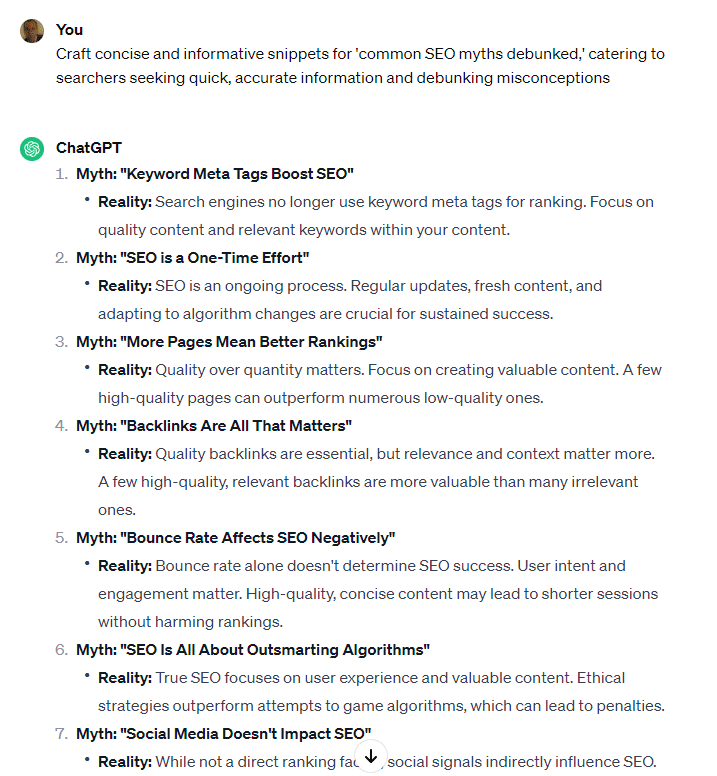
Prompt: Analyze the top 10 search results for "[Your Keyword]" and identify the most common words and phrases used in their snippets. Craft 3 different meta descriptions for your content, each incorporating those high-ranking terms while maintaining originality and relevance.
Prompt: For the keyword "[Your Keyword]," identify 5 distinct user intents or motivations behind the search. Create separate meta descriptions that directly address each intent, ensuring your content aligns with what users are seeking.
Prompt: Identify 5 common questions related to "[Your Keyword]" that users often ask in search queries. Write concise and informative meta descriptions that directly answer those questions, aiming for featured snippet opportunities.
Prompt: Analyze the meta descriptions of the top 3 ranking competitors for "[Your Keyword]". Identify their strengths and weaknesses in terms of clarity, persuasiveness, and keyword usage. Craft a meta description that outshines theirs by addressing their shortcomings and incorporating unique value propositions.
Prompt: Structured Data Symphony: Generate a list of relevant schema markup types that can enhance your snippets for "[Your Keyword]". Provide examples of how to implement them for various content formats (recipes, product pages, reviews, etc.).
Explanation: Snippets, occupying prime space in search results, significantly impact click-through rates and visibility. This prompt focuses on creating concise yet informative snippets debunking common SEO myths. The content should provide accurate information, debunk misconceptions, and offer brief but comprehensive explanations.
By addressing user queries directly and offering valuable insights, these snippets aim to attract clicks, enhance credibility, and indirectly improve SEO performance.
Classify Keywords by Search Intent
Intent Clarification:
"Classify the following keywords based on search intent (informational, commercial, navigational, or transactional): [list of keywords]."
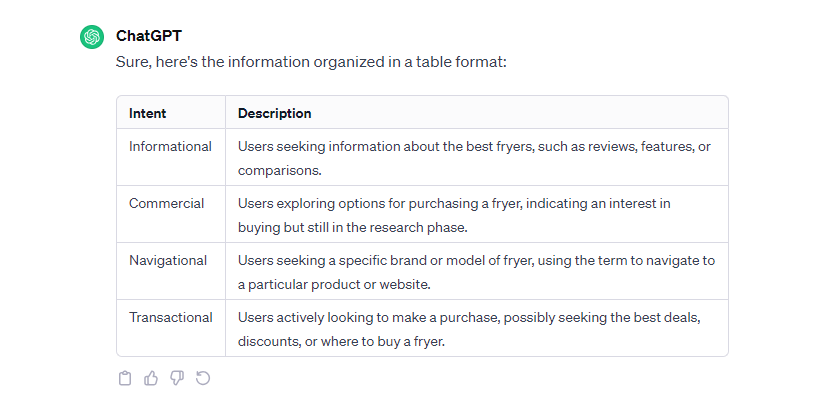
"For each keyword, state whether the user is likely looking for information, to make a purchase, to navigate to a specific website, or to complete a specific action."
"Create a table with three columns: Keyword, Search Intent, and Example User Query."
Intent Deep Dive:
"For each keyword, provide 3-5 example user queries that would align with that search intent."
"Identify any keywords that could potentially have multiple search intents, and explain the different ways users might search for them."
"Categorize the keywords based on the stage of the buyer's journey they represent (awareness, consideration, decision)."
User Perspective:
"Imagine you are a user searching for each keyword. What are you hoping to find? What problem are you trying to solve?"
"Consider the context in which a user might search for each keyword. What are they likely doing or thinking at that moment?"
"Identify any keywords that suggest a sense of urgency or need for immediate action."
Beyond Basic Classification:
"For transactional keywords, identify the specific action the user is likely trying to complete (e.g., purchase, sign up, download)."
"For informational keywords, identify the level of knowledge or expertise the user is likely to have."
"For navigational keywords, identify the specific website or page the user is likely trying to reach."
Creative Exploration:
"Generate a list of 5-10 additional keywords that could be related to each search intent category."
"Suggest content topics or formats that would be well-suited to each search intent."
"Identify potential opportunities to create content that addresses multiple search intents within a single piece."
On-page SEO
Prompt: Brainstorm 10 creative image captions for your "[Your Topic]" content, incorporating relevant keywords and engaging users with humor, curiosity, or informative details.
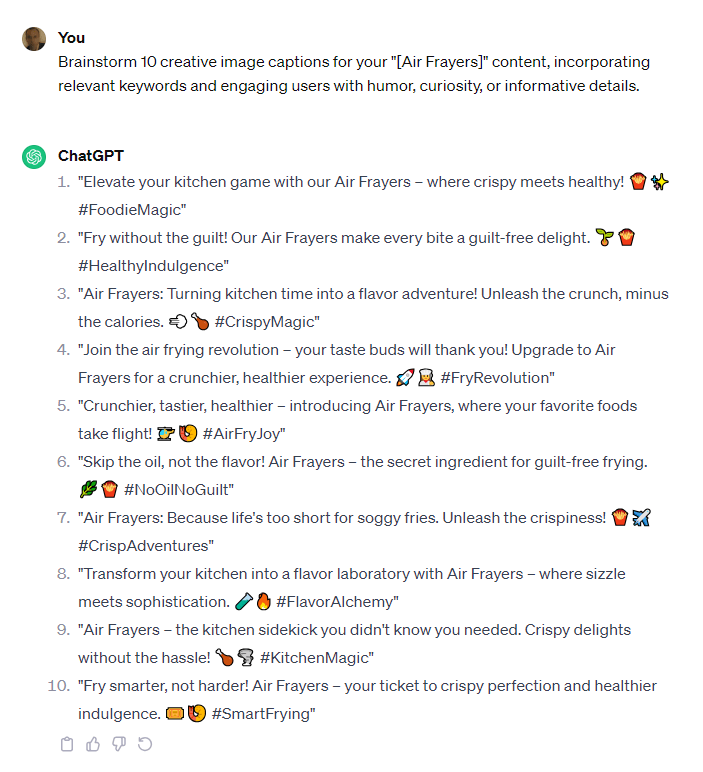
Prompt: Research the most relevant schema markup types for your "[Your Topic]" and generate example code snippets you can implement, enriching your page's search engine understanding and potentially boosting featured snippets.
Prompt: Analyze your "[Your Topic]" page for potential speed optimization improvements. Use ChatGPT to generate concise instructions or code snippets to address issues like image compression, caching settings, and minification.
Prompt: Review your "[Your Topic]" page on various mobile devices and identify any navigation or formatting issues. Create a checklist of adjustments to ensure a seamless mobile experience for users.
Prompt: If your content targets a specific geographic location, use ChatGPT to research local search trends and generate localized elements like slang, cultural references, or region-specific examples to enhance relevance.
Prompt: Analyze the on-page SEO strengths and weaknesses of your top 3 competitors for "[Your Keyword]". Craft a list of actionable steps you can take to outperform them in various aspects like content depth, technical optimization, and user engagement.
Prompt: Develop a test plan for different on-page elements like headlines, calls to action, or image placements on your "[Your Topic]" page. Use ChatGPT to generate variations and track performance metrics to continuously optimize your content for the best results.
Prompt for SEO Titles
Remember, the best SEO titles are clear, concise, and relevant to your content. Use these prompts to spark your creativity and craft titles that grab attention, rank high in search results, and ultimately convert clicks to customers.

Intrigue Your Niche: "Craft 5 irresistible SEO titles for my audience of busy moms seeking healthy recipe hacks, using the keyword 'quick meals.'"
Challenge Assumptions: "Write 3 provocative SEO titles for a blog post debunking common fitness myths, targeting skeptical gym enthusiasts."
Humor Your Crowd: "Generate 4 funny and attention-grabbing SEO titles for an article on DIY gardening disasters, aimed at millennial plant parents."
List-Centric Power: "Give me 10 numbered SEO titles using the keyword 'productivity tips,' highlighting unexpected strategies for increased efficiency."
Benefit-Driven Brilliance: "Create 7 question-based SEO titles targeting small business owners, promising solutions to their biggest marketing challenges."
Storytelling Spark: "Compose 5 SEO titles incorporating vivid verbs and sensory details to draw readers into a travel blog post about hidden gems in Thailand."
Long-Tail Twists: "Use the long-tail keyword 'vegan dessert alternatives for chocolate lovers' to craft 8 tempting and specific SEO titles."
Local Lure: "Write 5 SEO titles for a bakery website in Boston, incorporating local landmarks and seasonal flavors to attract foodies."
Trendjacking Triumph: "Generate 3 timely and relevant SEO titles based on the latest news about sustainable fashion, targeting eco-conscious consumers."
Localized Content Generation
Prompt: "Produce location-specific content for 'best restaurants in [City Name],' emphasizing unique dining experiences and local culinary highlights for enhanced local SEO."
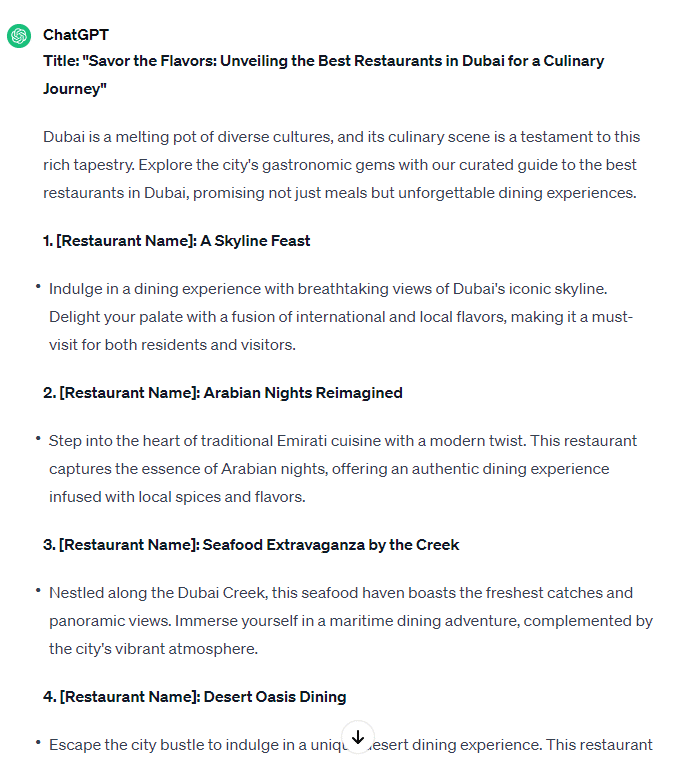
Prompt: Analyze the top 3 competitors' localized content for "[Your Keyword]" in your target location. Identify their most successful content types, commonly used keywords, and cultural nuances they capture. Create 2 content ideas inspired by their strengths, but adding your unique spin and addressing any gaps they might have left.
Explanation: Localized content is instrumental in targeting specific geographical audiences and improving local search visibility. This prompt aims to generate content spotlighting the best restaurants in a particular city. The content should highlight unique dining experiences, local culinary specialties, ambiance, customer reviews, and perhaps even chef interviews.
By emphasizing local attractions and experiences, this content aims to boost local SEO visibility for restaurants in the specified city, attracting both locals and tourists.
SEO blog posts prompts
Remember, strong SEO blog posts offer value, engage readers, and ultimately drive conversions. Use these prompts to craft content that stands out, attracts traffic, and establishes your authority in your field.
Counterintuitive Approach: "Write an SEO blog post titled 'Why I Ditched [Popular Industry Practice] and Saw [Positive Result],' sharing your unique experience and insights."
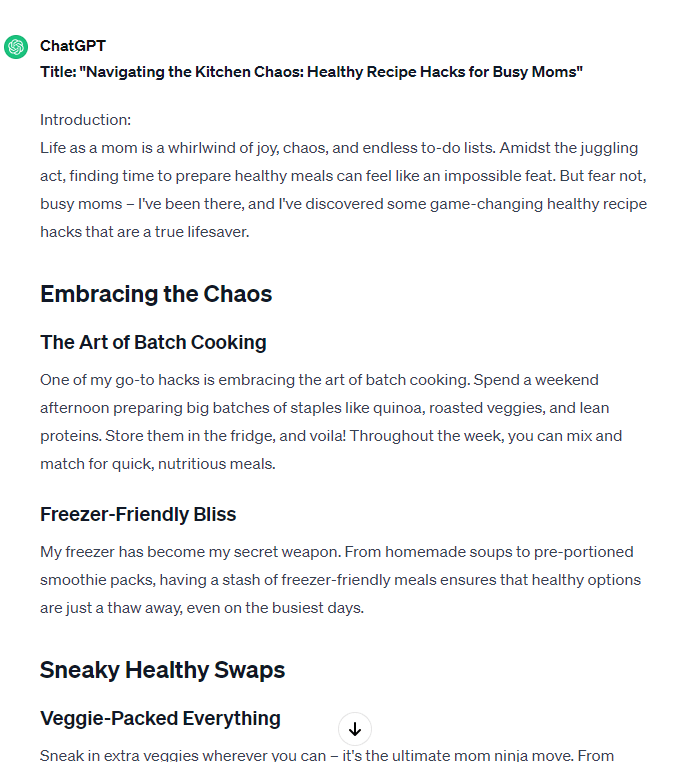
Data-Driven Deep Dive: "Analyze a recent industry report and generate an SEO blog post highlighting surprising trends and actionable takeaways for your target audience."
Personal Story Power: "Craft an SEO blog post weaving a relatable personal story around your expertise, showcasing your knowledge and building trust with readers."
Local Spotlight: "Turn a local event or challenge into an SEO blog post showcasing your business's involvement and expertise, targeting interested readers in your area."
Debate & Controversy: "Fuel discussion with an SEO blog post taking a controversial stance on an industry issue, backed by data and presented in a balanced way."
Interactive Journey: "Develop an SEO blog post structured as a quiz or decision tree, guiding readers through a personalized experience and offering solutions based on their choices."
Case Study Showcase: "Transform a client success story into an SEO blog post highlighting your problem-solving skills and showcasing the benefits of your services."
"Ultimate Resource" Round-up: "Compile a comprehensive SEO blog post listing the top tools, trends, or experts in your niche, establishing yourself as a thought leader."
Behind-the-Scenes Peek: "Offer a behind-the-scenes look at your creative process or company culture in an SEO blog post, engaging readers and building brand loyalty."
Future Forward Thinking: "Predict upcoming trends or challenges in your field in an SEO blog post, positioning yourself as an innovator and attracting forward-thinking readers."
Expert Interview Spark: "Craft an SEO blog post based on an interview with a prominent figure in your niche, extracting valuable insights and expert opinions."
Data Visualization Wow: "Incorporate interactive data visualizations or infographics into your SEO blog post to enhance reader engagement and comprehension."
Guest Post Powerhouse: "Pitch a guest post idea for a high-traffic blog in your niche based on a unique and SEO-worthy topic relevant to both audiences."
Email Templates For Outreaching
Prompt: "Create an email script asking for guest post collaboration. Keep the tone professional and include a CTA at the end."
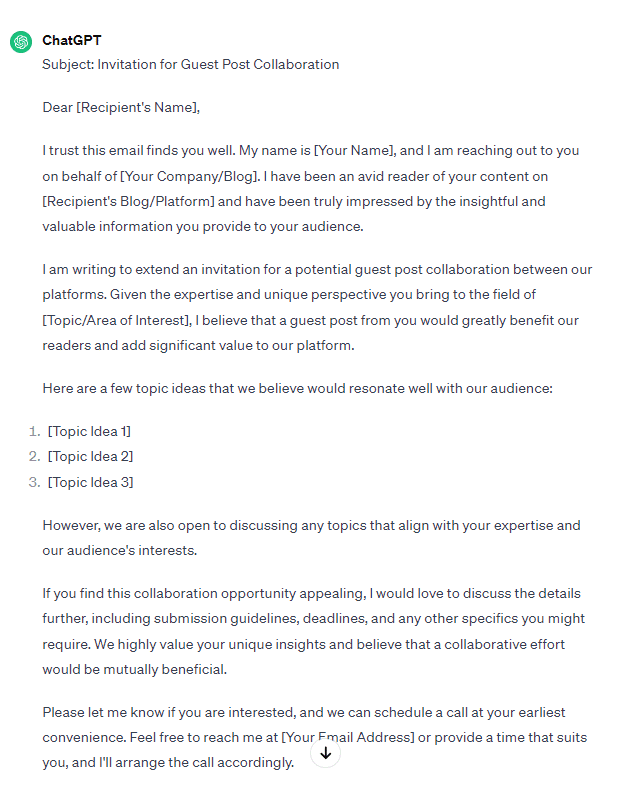
Prompt: Craft 2 email templates proposing collaborative opportunities with "[Target Partner]" related to "[Your Offering]." One template can focus on co-marketing initiatives, while the other explores the potential for joint product development or service integration. Highlight mutual benefits and shared objectives.
Prompt: Design an email template suggesting a cross-promotional campaign with "[Target Partner]." Offer creative ideas like guest blog posts, social media mentions, or bundled product/service discounts to mutually benefit your audiences.
Prompt: Write an email proposing a collaborative content series or competition with "[Target Partner]." Brainstorm potential themes and formats that leverage both brands' strengths and engage audience participation.
Prompt: Compose an email suggesting a joint advocacy initiative or industry event with "[Target Partner]." Focus on a shared cause related to your field and leverage combined resources to amplify your impact.
Prompt: Draft an email proposing a data-sharing partnership with "[Target Partner]." Explore opportunities to combine expertise and analyze trends to gain deeper insights into your target audience and develop new product/service offerings.
Explanation: It provides a structured template for establishing guest posting opportunities.
The email script follows a professional yet friendly tone, introducing the sender, showcasing their expertise, and expressing genuine interest in contributing value to the recipient's platform. It serves as a starting point, guiding users on how to initiate contact with potential collaborators clearly and concisely.
This standardized approach ensures that important elements, such as introducing oneself, highlighting expertise, proposing collaboration, and maintaining a polite tone, are consistently included in the communication.
Ultimately, it increases the efficiency of outreach efforts, enhances the chances of establishing successful guest posting partnerships, and ultimately increases brand exposure.
Content For Video Descriptions
Prompt: "Craft SEO-friendly descriptions for 'YouTube tutorial videos on SEO tools,' highlighting key points and benefits to enhance video visibility and audience engagement."
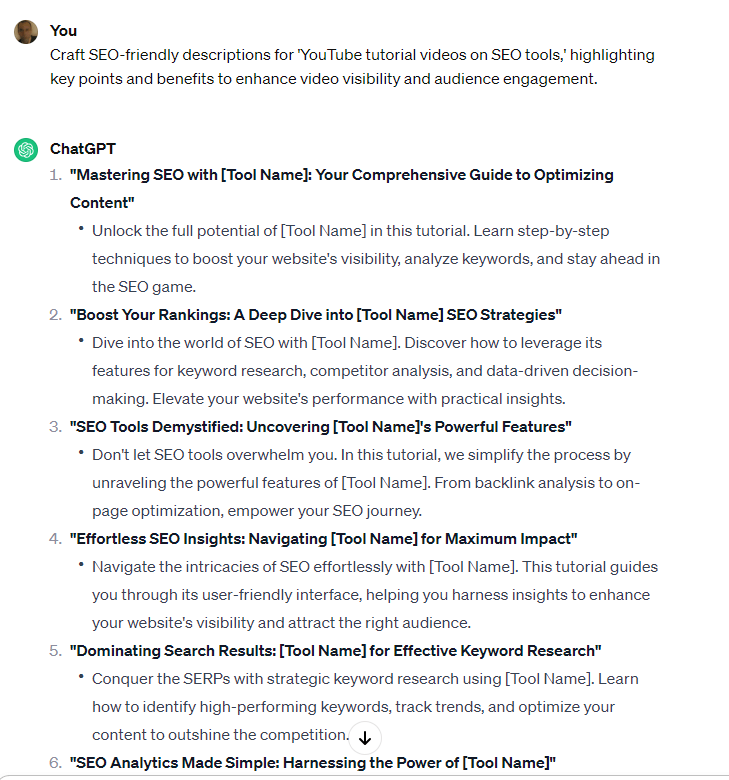
Prompt: Identify the 5 most relevant keywords for "[Your Video Topic]." Craft a video description that naturally integrates these keywords, ensuring both SEO optimization and clear communication of your video's content.
Prompt: Generate 5 attention-grabbing opening sentences for your video description about "[Your Video Topic]," each using different tactics like humor, curiosity, urgency, or surprise. Tailor them to your target audience's interests and capture their instant attention.
Prompt: Identify the 5 most relevant keywords for "[Your Video Topic]." Craft a video description that naturally integrates these keywords, ensuring both SEO optimization and clear communication of your video's content.
Explanation: Video content on platforms like YouTube significantly impacts SEO efforts with the help of various video editing tips. This prompt aims to create SEO-friendly descriptions for tutorial videos related to SEO tools.
The content should highlight key points covered in the videos, elaborate on their benefits, and provide additional relevant information to optimize video visibility.
By enhancing the video descriptions with targeted keywords, relevant information, and engaging content, the aim is to attract viewers, boost audience engagement, and indirectly impact SEO performance.
Each of these prompts serves as a strategic input to leverage ChatGPT's capabilities for creating tailored content that aligns with SEO goals, addresses specific niches, and targets diverse aspects of content optimization and audience engagement.
Tips to Create Better Chat GPT Prompts for SEO
Creating effective Chat GPT prompts for SEO involves a combination of strategic thinking, understanding search engine algorithms, and crafting content that resonates with both users and search engines. Here are comprehensive tips to create better Chat GPT prompts for SEO:
Keyword Research and Integration:
- Begin by conducting thorough keyword research to identify relevant and high-ranking keywords in your niche. Tools like SEMrush, Ahrefs, or Google Keyword Planner can help.
- Incorporate these keywords naturally into your prompts. Ensure they flow well within the context of the conversation without sounding forced or unnatural.
Focus on User Intent:
- Understand the user's intent behind the search queries. Optimize your prompts to provide valuable, relevant, and concise information that directly addresses user queries.
- Anticipate different user intents (informational, navigational, and transactional) and tailor prompts to cater to these intents effectively.
Structured Content:
- Structure prompts to provide clear and concise information. Use bullet points, numbered lists, or headings where applicable to improve readability and SEO.
- Consider using FAQ-style prompts to directly address common user queries. This format tends to perform well in search engine results.
Natural Language and Conversational Tone:
- Craft prompts in a conversational tone that resonates with users. Chat GPT performs better when the language feels natural and human-like.
- Avoid overly technical language or industry jargon that might alienate or confuse users. Aim for simplicity and clarity.
Long-Tail Keywords and Variations:
- Incorporate long-tail keywords and their variations within the prompts. These phrases often have less competition and can attract more targeted traffic.
- Use natural language variations that users might employ when searching for information. Chat GPT can be trained to recognize and respond to these variations.
Optimize Length and Readability:
- Keep prompts concise and to the point while ensuring they sufficiently answer the user query.
- Break down information into digestible chunks. Avoid overly lengthy prompts that might overwhelm users.
Engagement and Value Addition:
- Encourage engagement with the prompts. Include calls-to-action (CTAs) where appropriate to guide users to further relevant content or actions.
- Provide value-addition in the prompts by offering additional resources, links to related content, or helpful suggestions.
Internal Linking Strategy:
- Strategically incorporate internal links within the prompts to direct users to relevant pages on your website. This helps in improving the user experience and site navigation.
- Ensure the linked pages are contextually related to the conversation to enhance the overall user experience.
Regularly Update and Optimize:
- Continuously review and update your prompts to align with the latest trends, changes in user behavior, and search engine algorithms.
- Monitor the performance of your prompts using analytics tools and refine them based on user interaction and SEO performance metrics.
Test and Iterate:
- Conduct A/B testing to evaluate different versions of prompts to determine which ones perform better in terms of user engagement and SEO metrics.
- Based on the test results, iterate and refine your prompts to continually improve their effectiveness.
By focusing on these aspects, you can create better-performing prompts that enhance the user experience and visibility in search engine results.
How ChatGPT Prompts Help SEO
Using ChatGPT prompts for SEO offers several advantages that can significantly enhance a website's visibility, engagement, and overall search engine performance. Let’s take a look at the benefits:
Content Generation: ChatGPT can generate high-quality, relevant content for various SEO purposes. It crafts engaging meta descriptions, compelling titles, and informative snippets that can enhance click-through rates (CTR) and improve search engine results page (SERP) rankings.
Keyword Optimization: ChatGPT can help with keyword research and optimization. By providing prompts related to specific keywords or topics, it assists in creating content that aligns with search intent, improving organic visibility.
Natural Language Processing (NLP): With its advanced NLP capabilities, ChatGPT creates content that matches the conversational tone and query-based language users employ in search engines. This helps in catering to long-tail keywords and voice search queries, boosting SEO for these critical areas.
Content Expansion and Diversification: By providing diverse prompts and perspectives, ChatGPT encourages content expansion. It assists in creating comprehensive, in-depth articles, which tend to rank better in search results due to their informational value.
Content Optimization: ChatGPT prompts facilitate the optimization of existing content. It suggests improvements, edits, or additions to make the content more SEO-friendly, ensuring it meets current best practices and search engine algorithms.
User Engagement and Retention: Engaging content generated through ChatGPT prompts can keep users on a website for longer durations. Higher user engagement metrics, such as longer session durations and lower bounce rates, positively impact SEO rankings.
Featured Snippets and Rich Answers: ChatGPT-generated content can provide concise, informative answers to common queries, increasing the chances of appearing in featured snippets or rich answer boxes, which elevate visibility on SERPs.
Content Freshness and Regular Updates: By offering prompts for new content ideas or updates, ChatGPT helps maintain content freshness—an important factor in search engine algorithms. Regularly updated content signals relevance and authority to search engines, positively impacting rankings.
Linkable Content Creation: ChatGPT prompts assist in generating valuable, link-worthy content. High-quality content naturally attracts backlinks, contributing to improved domain authority and higher SERP rankings.
Adapting to Algorithm Changes: ChatGPT can assist in adapting to search engine algorithm changes. By providing updated prompts based on the latest SEO trends and guidelines, it aids in creating content that complies with the evolving algorithms.
Local SEO Enhancement: By generating location-specific content or addressing local queries, ChatGPT prompts can enhance a website's visibility for local searches, thereby improving local SEO efforts.
Ultimately, leveraging ChatGPT prompts can significantly bolster a website's SEO strategy, leading to enhanced visibility, increased organic traffic, and improved rankings on search engine results pages.
Conclusion
ChatGPT prompts have emerged as indispensable tools in the arsenal of SEO professionals and content creators, revolutionizing the landscape of content generation and optimization.
Their ability to generate tailored, high-quality content aligned with SEO best practices empowers businesses to enhance their online visibility, drive organic traffic, and engage audiences effectively.
As AI technology continues to evolve, the strategic utilization of ChatGPT prompts remains a key factor in staying ahead in the competitive realm of digital marketing and SEO.
Incorporating ChatGPT prompts intelligently into SEO strategies not only streamlines content creation but also elevates the overall quality, relevance, and effectiveness of digital content, ultimately contributing to improved search engine rankings and sustained online success.
